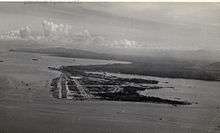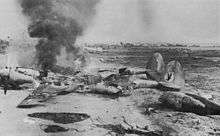Daniel Z. Romualdez Airport
| Daniel Z. Romualdez Airport Luparan Daniel Z. Romualdez (Waray) Paliparang Daniel Z. Romualdez (Tagalog) | |||||||||||
|---|---|---|---|---|---|---|---|---|---|---|---|
|
Exterior of Daniel Z. Romualdez Airport as of June 2015 | |||||||||||
| Summary | |||||||||||
| Airport type | Public | ||||||||||
| Operator | Civil Aviation Authority of the Philippines | ||||||||||
| Serves | Tacloban | ||||||||||
| Location | DZR Airport Complex, San Jose, Tacloban | ||||||||||
| Elevation AMSL | 3 m / 10 ft | ||||||||||
| Coordinates | 11°13′39″N 125°01′40″E / 11.22750°N 125.02778°ECoordinates: 11°13′39″N 125°01′40″E / 11.22750°N 125.02778°E | ||||||||||
| Website |
taclobancityairport | ||||||||||
| Map | |||||||||||
.svg.png) TAC/RPVA Location within the Philippines | |||||||||||
| Runways | |||||||||||
| |||||||||||
| Statistics (2016) | |||||||||||
| |||||||||||
Daniel Z. Romualdez Airport (Waray: Luparan Daniel Z. Romualdez, Tagalog: Paliparang Daniel Z. Romualdez) (IATA: TAC, ICAO: RPVA), also known as Tacloban City Airport, is an airport serving the general area of Tacloban, a highly urbanized city on Leyte island in the Philippines. It is the main gateway from Manila and Cebu to the Eastern Visayas Region in central east Philippines. It is classified as a Class 1 principal (major domestic) airport by the Civil Aviation Authority of the Philippines, the agency responsible for the operations of all the airports in the Philippines excluding the major international airports. As of 2013, Daniel Z. Romualdez Airport is ranked as the eighth-busiest airport by passenger volume out of the 45 commercial airports in the Philippines.
The airport is named after Daniel Z. Romualdez, a former speaker of the Philippine House of Representatives. It is one of two airports in the Philippines named after a member of the Romualdez family, the other being Imelda R. Marcos Airport in Mati after Imelda Romualdez-Marcos, the wife of the late president Ferdinand Marcos.
On 8 November 2013, the airport was largely destroyed due to the onslaught of Typhoon Haiyan.[2] On 17 January 2015, the airport apron was the site of a large open-air mass held by Pope Francis that attracted nearly half a million pilgrims coming from all over the country to remember the effects of Typhoon Haiyan.[3][4]
History


_25_drops_supplies_to_Tacloban_Air_Base%2C_Philippines%2C_in_support_of_Operation_Damayan_Nov._14%2C_2013_131114-N-BX824-004.jpg)
During World War II
First known as San Jose Airstrip, after the village where it is located, it was constructed as an airstrip for the US Air Force during World War II. USAF units based here included the 43d Bombardment Wing (15 November 1944 – 16 March 1945), 345th Bombardment Group (1 January – 13 February 1945), 417th Bombardment Group (6 December–22, 1944), 49th Fighter Group (24 October – 30 December 1944), 348th Fighter Group (16 November 1944 – 4 February 1945), 421st Night Fighter Squadron (25 October 1944 – 8 February 1945), and the 547th Night Fighter Squadron (9 November 1944 – 11 January 1945).
After World War II, when the airport was converted for use in commercial aviation, it became known popularly as Tacloban National Airport . The airport was given its current name in honor of Daniel Z. Romualdez, a representative from Leyte who became the 10th speaker of the Philippine House of Representatives. He was the uncle of Imelda Romualdez Marcos, the wife of president Ferdinand E. Marcos.
Devastation by Typhoon Haiyan
On 7–8 November 2013, Typhoon Haiyan roared through Tacloban and the Eastern Visayas Region. The Tacloban Airport was effectively destroyed by winds averaging to 195 mph (314 km/h) and a 13-foot (4.0 m) storm surge. The airport terminal and the control tower were utterly demolished, and the airport was rendered unusable. However, on 11 November, the airport reopened, but for turboprop aircraft only.[2] The airport has now since been reopened again to A320s regularly serving the airport.[5]
On 17 January 2015, the airport apron was the site of a large open air mass held by Pope Francis that attracted nearly half a million pilgrims coming from all over the country to remember the effects of Typhoon Haiyan.[3][4]
Facilities
Daniel Z. Romualdez Airport includes a single-story terminal building, a communications tower and an administrative building. The single-story terminal building consists of the departure and arrival area. The departure area has one boarding gate, scanners, and a souvenir counter. The arrival area consists of a single baggage carousel, and a porters' assistance desk. The communications tower is located on the east end of the terminal building. It serves as the main communications facility of the airport. The administrative building houses the offices of airport staff and the Civil Aviation Authority of the Philippines.
Ground transportation
Access to the airport from central Tacloban is served by the jeepney services on the Downtown-San Jose-Airport route, from Marasbaras route, and the service from nearby Palo. In 2010, an airport taxi service was opened to shuttle passengers from the airport to the city's Central Bus Terminal, the city's commercial area and other destinations such as the San Juanico Bridge and the MacArthur Landing Memorial in Palo and to Tacloban's suburbs.
Future development
A new terminal building has been proposed by the city government of Tacloban, to replace the current building. The new terminal, which would cost 300 to 350 million pesos, will be built through a Build-Operate-Transfer scheme. Around 500 million pesos was allocated for the terminal's construction, with the city government collecting a share of current terminal fees to shoulder its expenses in constructing the new terminal.
In August 2012, The Department of Transportation and Communications as part of the P319 million modernization of the Tacloban and Dipolog airports allocated P251.6 million for the Tacloban Airport to construct a new apron and taxiway. The allocation also involves the completion of the north-east shore protection with shoulder grade correction, the construction of a drainage system with box culverts, and the construction of temporary transition.[6]
On 13 September 2012, the Budget department has released P4.6 billion to support the public-private partnership (PPP) projects of the Department of Transportation and Communications (DOTC). Of the total, Tacloban City Airport will receive P800 million to help it accommodate the growing air traffic by developing the terminal building and other ancillary facilities.[7]
Airlines and destinations
| Airlines | Destinations |
|---|---|
| Cebu Pacific | Manila |
| Cebu Pacific operated by Cebgo | Cebu, Davao [8] |
| Philippine Airlines operated by PAL Express | Cebu, Manila |
| Philippines AirAsia | Manila |
Statistics
Daniel Z. Romualdez Airport is one of the top 10 busiest airports in the Philippines by passenger traffic with an annual average increase of 2.6 percent in the last 10 years. As of 2013, it holds the eighth spot among commercial airports in the country.
| Year | Passenger Arrivals | % Change |
|---|---|---|
| 2001 | | |
| 2002 | | |
| 2003 | | |
| 2004 | | |
| 2005 | | |
| 2006 | | |
| 2007 | | |
| 2008 | | |
| 2009 | | |
| 2010 | | |
| 2011 | | |
| 2012 | | |
| 2013 | | |
| 2014 | | |
| 2015 | | |
| 2016 | | |
Incidents
- On 4 August 1984, a Philippine Airlines flight overshot runway 36 by 100 feet and landed at sea. All 70 passengers and five crew survived.[19]
- On 15 February 2007, a Philippine Airlines flight from Manila overshot the runway. There were no casualties among 133 passengers and six crew members. DZMM Correspondent Hector Go said the aircraft’s front wheel ended up in the past the airstrip after the plane attempted to touch down in the middle of the runway around 7 a.m.[20]
- On 13 February 2009, a Cebu Pacific plane engine sucked a bird into its engine damaging the blades.[21]
- On 7 May 2010, a Cebu Pacific ATR 72-500, while parked and finishing boarding procedures for its Tacloban-Cebu flight (5J-429), was hit at the wingtip by an incoming Philippine Airlines Airbus A320-214 which was taxiing after arriving from Ninoy Aquino International Airport in Manila.
- On 8 November 2013, Typhoon Haiyan (Yolanda) destroyed the airport's terminal building.[22] The airport has now since been reopened again to A320s regularly serving the airport.[5]
- On 17 January 2015, a Bombardier twin-engine jet, carrying Cabinet members Ochoa and Coloma, overshot the runway after it failed to take-off shortly after the Pope's plane took off. There were no casualties.[23]
- On 3 November 2016 After 1:30 pm Tacloban airport has been closed for immediate runway repairs, affecting 3,500 passengers.
See also
References
- ↑ "Busiest Airports in 2016". Philippine Air Space (Blog). Retrieved April 3, 2017.
- 1 2 "Tacloban Airport reopens three days after being declared 'ruined'". GMA Network. 11 November 2013. Retrieved 2013-11-12.
- 1 2 Martinez, Michael (17 January 2015). "In wind and rain, Pope leads Mass for thousands in Philippines". CNN International. Retrieved 2 October 2015.
- 1 2 Diola, Camille (17 January 2015). "Pope Francis braves 'Amang,' moves Tacloban with homily". The Philippine STAR. Retrieved 2 October 2015.
- 1 2 Apolonio, Eric (14 November 2013). "Airbus A320 allowed to resume flights to Tacloban". Interaksyon.com. Retrieved 1 January 2014.
- ↑ Amojelar, Darwin (31 August 2012). "DOTC bids out P319-M modernization of Tacloban, Dipolog airports". Interaksyon.com. Retrieved 2 October 2015.
- ↑ Jiao, Diane Claire (13 September 2012). "Budget Dept. Released Php 800M to Tacloban Airport". BusinessWorld Online. Retrieved 15 September 2013.
- ↑ http://cebupacificaircorporate.com/Pages/news.aspx?id=1126
- ↑ http://caap.gov.ph/index.php/downloads/finish/13-statistics/27-aircraft-movement-cy-2011
- ↑ http://caap.gov.ph/index.php/downloads/finish/13-statistics/28-aircraft-movement-cy-2012
- ↑ http://caap.gov.ph/index.php/downloads/finish/13-statistics/5292-aircraft-movement-cy-2013
- ↑ No record for the months of June to December
- ↑ http://caap.gov.ph/index.php/downloads/finish/13-statistics/5293-aircraft-movement-cy-2014
- ↑ Scaled-down operation due to massive repairs
- ↑ http://data.gov.ph/catalogue/dataset/2011---2015-air-traffic-data---air-transportation-passenger-movement
- ↑ https://en.m.wikipedia.org/wiki/List_of_the_busiest_airports_in_the_Philippines
- ↑ https://www.foi.gov.ph/requests/aglzfmVmb2ktcGhyHgsSB0NvbnRlbnQiEUNBQVAtNzk1MzYwOTIxODk1DA
- ↑ https://en.m.wikipedia.org/wiki/List_of_the_busiest_airports_in_the_Philippines
- ↑ "Accident description: BAC One-Eleven 527FK RP-C1182 Tacloban Airport (TAC)". Aviation Safety Network. Retrieved 2 October 2015.
- ↑ Desacada-Garcia, Miriam (16 February 2007). "PAL plane overshoots runway in Tacloban". The Philippine STAR. Retrieved 2 October 2015.
- ↑ "Cebu Pacific plane grounded by 'bird strike' in Tacloban". 13 February 2009. Retrieved 2 October 2015.
- ↑ Cooper, Anderson; Stevens, Andrew; Mullen, Jethro (15 November 2013). "A week after Typhoon Haiyan hit, grim realities sink in". CNN International. Retrieved 2 October 2015.
- ↑ Amio,Armin (17 January 2015). "Plane crashes in Tacloban airport". Manila Bulletin. Archived from the original on 4 October 2015. Retrieved 2 October 2015.
External links
| Wikimedia Commons has media related to Daniel Z. Romualdez Airport. |
- Airport information for RPVA at World Aero Data. Data current as of October 2006.
